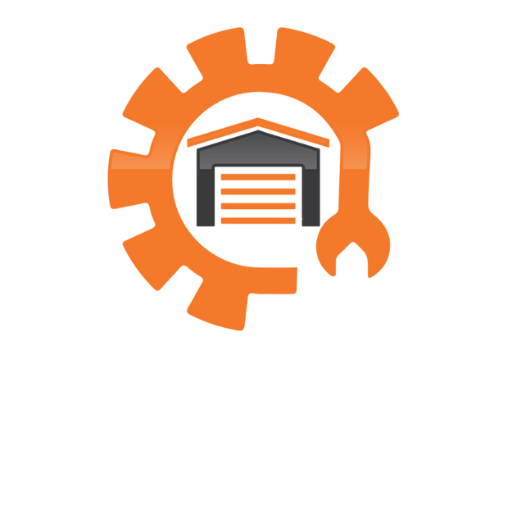Panel garage doors are made up of horizontal panels hinged together that roll vertically along tracks to open. The panels accordion fold against each other into the open position above the door opening.
Panel doors, also known as sectional garage doors, are the most common overhead garage door type, comprised of steel, aluminium, or composite panels that lift overhead via torsion springs and cables.
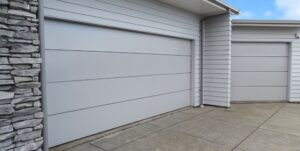
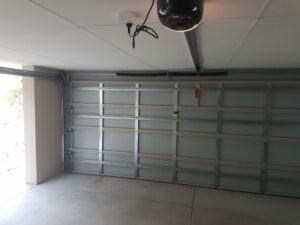
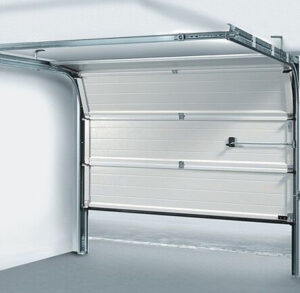
How Panel Garage Doors Work
Panel garage doors are constructed from horizontal panels, usually made of steel, aluminium, or composite materials like fibreglass. The panels are hinged together with rollers attached to the ends. The rollers fit into curved vertical tracks on both sides of the garage door opening.
When opening the door, the electric garage door opener activates and pulls a trolley system that lifts the door along the tracks. As it lifts, the hinged panels accordion fold backwards until stacked vertically in the open position. The panels remain perpendicular to the floor as they fold.
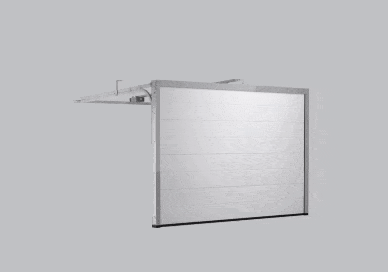
Once fully open, the panels take up minimal headroom in the garage since they run along the vertical tracks. To close, the opener runs in reverse and lowers each panel back down the tracks, with hinges allowing them to extend back to their horizontal position, sealing the door.
Panels are typically two feet wide or smaller, so a standard two-car garage door may have four panels. The smaller sections allow the door to open and close smoothly. The hinged joints also provide safety – if a panel becomes damaged, the other stays in place rather than dropping the entire door.
The track system allows panel doors to work efficiently with the garage ceiling height. This makes them suitable for most standard garages. Their panel construction also lends itself well to insulation and design options.
Benefits of Panel Garage Doors
The main benefits of Panel garage doors are mentioned below.
- Space saving – Panel doors fold up compactly, requiring minimal headroom. Tilt doors require overhead tracks, while roller doors need space in front of the opening.
- Safety – When a panel is damaged, the other panels stay in place rather than dropping the whole door. Tilt and roller doors are single rigid pieces.
- Insulation – Panels can be made of insulated materials or easily retrofitted with insulation. This provides climate control.
- Cost – Panel doors are generally the most economical overhead garage door option for upfront and maintenance costs.
- Appearance – Many aesthetic options for Panel doors include windows, materials, and finishes.
- Automation – Panel doors are the easiest to automate, with most garage door openers designed for them.
- Wind resistance – The panels have a larger combined surface area than tilt doors, providing better wind resistance.
- Versatility – Panel doors work well for garages of all ceiling heights and are less prone to weather damage.
- Easy installation – Panel door installation is straightforward for professionals and DIYers compared to other types.
- Commonality – Panel doors are ubiquitous, so replacement parts and technicians are readily available.
Consideration Before Choosing Sectional Garage Door
Some key considerations when choosing between panel, tilt, and roller garage doors are mentioned below.
- Garage ceiling height – Panel doors require minimal headroom. Tilt doors need ceiling tracks. Roller doors require space in front of the opening.
- Garage door opening size – Larger doors may benefit from tilt or roller doors, while panels work for standard openings.
- Budget – Panel doors are typically the most economical option.
- Durability needs – Heavier use benefits from more substantial tilt or roller doors. Panels suffice for regular residential use.
- Climate – Panel doors with insulation panels work well for temperature and climate control needs.
- Aesthetics – Panel doors offer panel design options. Tilt doors provide a more seamless look. Rollers are purely functional.
- Door clearance – Panel doors sit close to the opening on tracks. Tilt doors allow parking nearer the opening.
- Safety – Panel panels prevent complete door dropping. Tilt and roller doors can rapidly fall when springs fail.
- Automation – Panels easily integrate openers. Tilt automation is more complex but available.
- Maintenance – Panel doors are most accessible for DIY repairs. Tilt doors require professionals.
Considering ceiling height, intended use, budget, and appearance helps determine the best overhead garage door type for a particular home or facility.
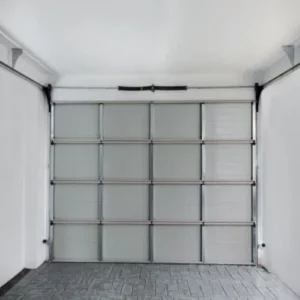
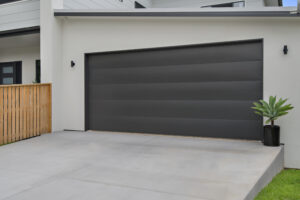

Panel Garage Door Materials
Here is an overview of common Panel garage door materials and which would be best for coastal areas:
- Steel – Steel is the most popular and affordable option. It is very durable against dents and impact. However, when not adequately maintained, steel can rust and corrode in coastal conditions.
- Aluminium – Aluminum is lightweight, rust-resistant, and does not corrode. This makes it a good choice for coastal climates, though it dents more easily than steel. Anodised aluminium offers even more excellent corrosion protection.
- Wood – Wood provides an aesthetic, classic look but requires extensive maintenance with painting and staining. Unless specially treated, it can easily warp or rot in coastal humidity and salt air.
- Fibreglass – Fibreglass is impact-resistant and won’t swell or rot. It mimics the look of wood but is tougher. Fibreglass is an excellent coastal option as long as the hardware is corrosion-resistant.
- Vinyl – Vinyl is rust-proof but can become brittle and fade over time when exposed to sun and salty air. It is not the best choice for highly coastal areas.
- Composite – Composite blends vinyl, wood fibre, and foam insulation. This creates a durable, low-maintenance panel. Composites withstand coastal conditions well.
Where Are Panel Garage Doors Commonly Used?
The most common uses for panel garage doors are as mentioned below.
- Residential garages – Panel doors are the most popular and common choice for homes. Their adjustable size and overhead operation work well for typical garages.
- Apartment and condo complexes – Panel doors allow access to individual parking garages in multi-tenant buildings. Their compact footprint fits well.
- Commercial warehouses & facilities – Panel doors are often used in auto repair shops, small warehouses, maintenance buildings, etc.
- Office park garages – Panel doors grant access to covered employee parking areas while providing security after hours.
- Airplane hangars – Smaller general aviation hangars often utilise panel doors rather than large sliding or bi-fold doors.
- Fire stations – Firetruck bays will have large panel doors to accommodate the tall vehicles.
- Barns – Some barns and agricultural buildings use panel doors for vehicles and equipment.
- Storage facilities – Storage facilities, warehouses, and self-storage buildings use panel doors for interior climate control and security.
Risks and Precautions with Panel Garage Doors
Some key risks and precautions to consider with Panel garage doors are mentioned below.
- Pinch points – Sections folding up can create pinch points. Keep hands clear of hinges and track openings.
- Heavy springs – Torsion springs are under high tension and can cause injury if mishandled. Leave adjustments to professionals.
- Trapped fingers – Fingers stuck between sections as the door closes can cause serious injury. Install sensors to reverse closing.
- Falling door – If springs break, the Panel door can rapidly fall if not properly balanced. Have cables installed as a backup.
- Struck by openers – Moving trolley openers can strike people or trap hands. Keep away when in motion.
- Child safety – Children should be kept from panel doors due to pinches and being struck by panels.
- Visibility issues – Solid panels can block sightlines when pulling in or out of garages. Install windows or be cautious.
- Electrical shock – Exposed wires or malfunctioning openers create a shock hazard. Ensure proper grounding procedures.
- Garage door safety cables – Cables minimise the risk of the door completely falling under spring failure. Have them installed
Panel garage doors provide versatility and reliability for all garages and openings. However, proper installation is key to ensuring they operate safely for years to come.
Garage Door Installation
For quality garage door installation, our staff at Pittwater Garage Doors are specially trained to handle residential and commercial sectional door projects from start to finish.
We thoroughly install the tracks, springs, cables, and motors and make adjustments to ensure optimal function.
With expertise in installing all major brands, we recommend the right solution for your needs.
